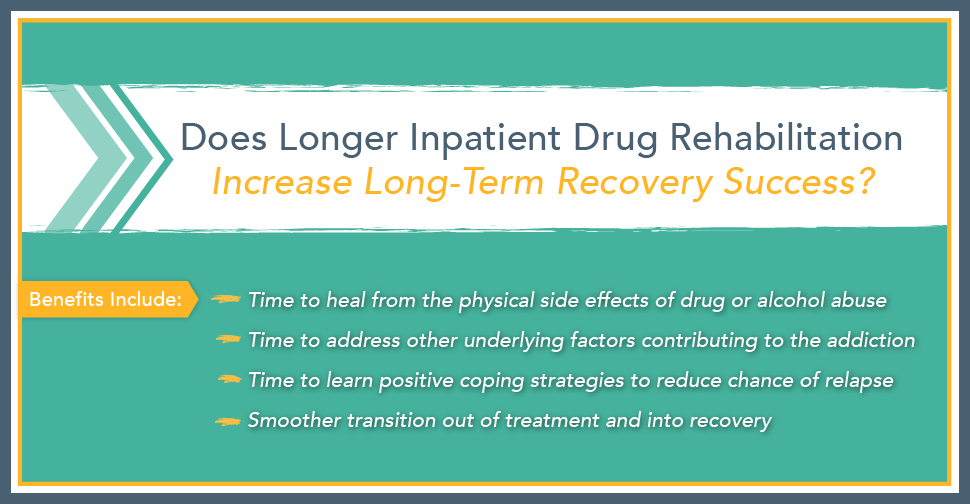
Longer inpatient drug rehabilitation increases long-term recovery success. The single critical component to that success? Time. There are factors across the board that can impact the success of a short-term or longer inpatient drug rehabilitation stay, but generally a longer stay in drug rehab is equated with positive outcomes all due to this essential element.
Longer inpatient drug rehabilitation increases long-term recovery success by transitioning an individual time to address not just the addiction, but the underlying factors that contributed to the addiction. It also provides an environment in which a person whose body and mind have been ravaged by addiction can have time to adjust and return to a more balanced state physically, mentally, and emotionally.
Evidence Supports Success Of Longer Inpatient Drug Rehab
Drug addiction behaviors may be stopped, but addiction is a disease with the ever-present possibility for relapse. Recovering from addiction takes time, and for some, a longer inpatient drug rehab program means the needed time and space away from their normal routine to learn to cope with the chronic elements of addiction like management of cravings and external stress. Cravings can be a tormenting force in early relapse and residential or longer duration inpatient care provides the continuum of care and support necessary to help someone succeed long-term
Many studies exist, each examining an array of factors, and nearly all point to the significance of a longer duration of care and support in improving treatment outcomes. One longitudinal study indicated those in drug rehab longer than a 30-day stay, had better employment outcomes following their treatment stay. Others have found that those individuals that stay for the duration of treatment, and continue to participate in meetings and a social network of recovery-oriented people, had far better success at five years than those who did not.
A study comparing four main treatment types for cocaine addiction found that long-term residential programs were more effective than outpatient pharmacological programs, outpatient programs like the 12-step or specialized therapies, and short-term treatment.
As with any form of rehab, whether it be for a physical or health condition, or for drug abuse, reinforcing positive behaviors, proactive actions and intentions, as well as continuing to address those issues that threaten recovery, is one way to increase an individual’s overall success.
Benefits Of Long-term Drug Rehabilitation
Time is the greatest benefit to long-term drug rehabilitation. Someone who is overcoming an addiction to opioids, alcohol, and other highly addictive substances will go through a withdrawal period that can last days to weeks. At the same time, treatment professionals are attempting to identify and treat co-occurring disorders. An individual who has abused drugs for a long time likely has suffered many physical consequences, including changes to diet and exercise that leave the person in a vulnerable state health-wise.
The healing process requires time and attention to these changes as they unfold. In some cases, an individual is physically and mentally in a state to overcome the challenges associated with the post-treatment transition period and is able to achieve recovery, but in many cases, relapse may occur multiple times before recovery is achieved. A long-term residential or outpatient program can reduce relapse rates and help with a smoother transition from rehabilitation to recovery.
Benefits of long-term treatment include:
- Time for withdrawal period to pass
- Time to assess and address co-occurring mental disorders
- Time to address other underlying factors contributing to the addiction
- Time to heal from the physical side effects of drug or alcohol abuse
- Time to learn positive coping strategies to reduce chance of relapse
- Opportunity to learn and reinforce positive behaviors, habits
- Smoother transition out of treatment and into recovery
Who Benefits From Longer Inpatient Treatment?
Certain populations may benefit specifically from longer inpatient treatment than others. Those dealing with multiple addictions or polysubstance abuse might require more time to adjust to life outside of drug abuse. Others with co-occurring mental disorders need time to stabilize and can benefit from the consistency of care and environment afforded by longer inpatient care.
In other cases, someone may achieve recovery, only to re-enter a toxic living environment or a co-dependent relationship that results in relapse. A longer inpatient drug rehab can provide a network of support and resources to help these individuals achieve stability in their lives as they begin to transition out of treatment.
Individuals suffering with chronic pain or other medical conditions, or someone with a history of relapse may also benefit from a longer inpatient program.
Who might benefit from longer inpatient care?
- Individuals suffering with polysubstance abuse
- Those with co-occurring mental disorders
- Individuals coming from codependent relationships or toxic environments
- Someone who has previously relapsed multiple times
- Persons with chronic pain or other medical conditions
Get Help Starting Now For Drug Or Alcohol Addiction
 If you are suffering with an addiction to drugs or alcohol and need, help is here and available around the clock. DrugRehab.org is your online resource connecting you with the evidence-based, compassionate care options and treatment professionals to help you get your life back on track.
If you are suffering with an addiction to drugs or alcohol and need, help is here and available around the clock. DrugRehab.org is your online resource connecting you with the evidence-based, compassionate care options and treatment professionals to help you get your life back on track.
Contact us to discover a new and rewarding life in recovery beginning right now.
